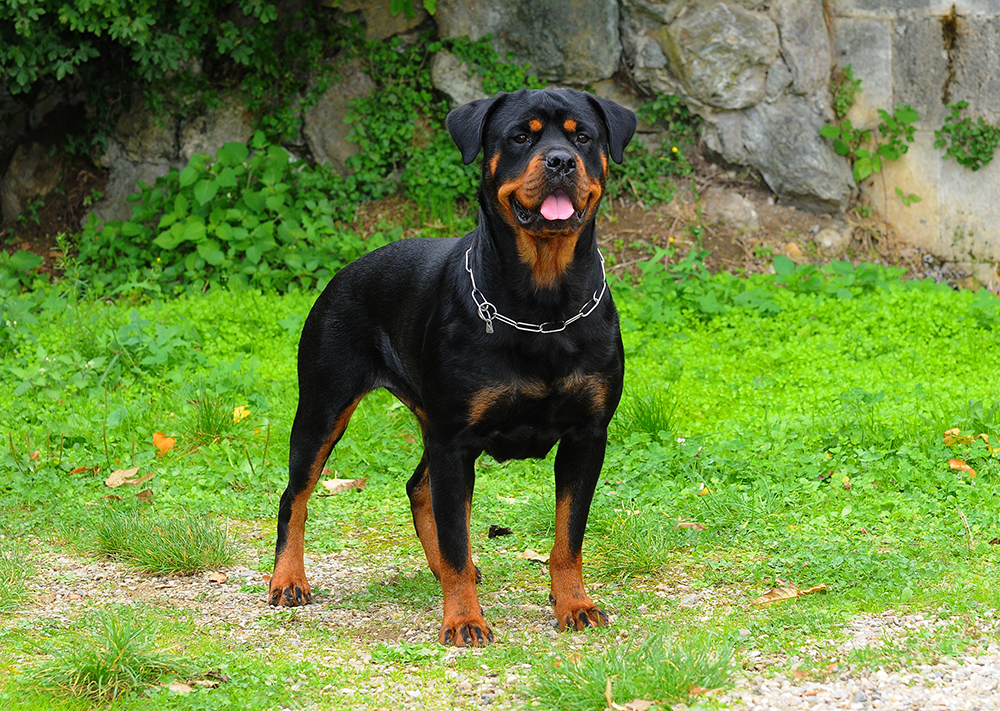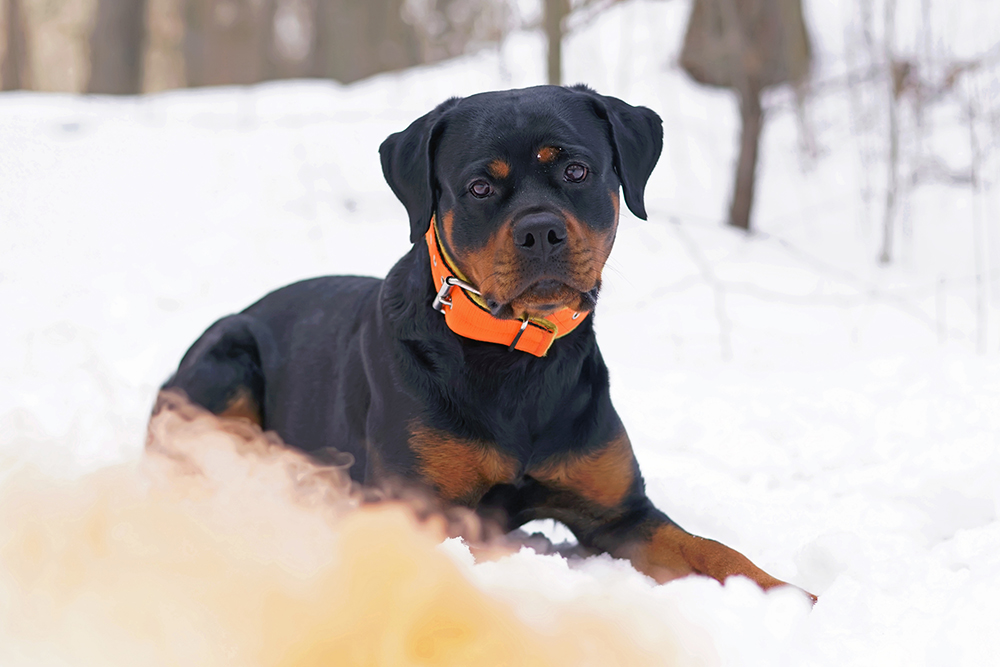Large breeds give owners more to love but also higher costs to expect, as you’ll discover when you realize all that goes into having a Rottweiler as the family pet. From food to equipment to training, the expenses involved in raising these dogs are much loftier than those of most breeds, and they’ll only increase as time goes on.
If you’re getting ready for a new household guardian and wondering, “How much does a Rottweiler cost?” We’ll break down the essential considerations to help you set a realistic budget.

Bringing Home a New Rottweiler: One-Time Costs
Bringing a Rottweiler home can cost as little as $350 or over $8,000 when you account for the adoption fees, gear, and consumables your dog will need. Essential equipment includes a crate, leash, collar or harness, food dishes, and bedding, all of which cost more for a dog weighing up to 135 pounds as an adult.
Free
You can typically find a free Rottweiler through friends, family, or local rescues. Foster programs are a great option if you aren’t sure if a Rottweiler is the best breed for you. As you help a dog and organization in need, you can also test everyday life with a Rottweiler without a long-term commitment or upfront adoption costs.


Adoption
Adoption is an inexpensive route to get a Rottweiler, saving upfront and long-term costs versus going through a breeder. Shelters often handle initial vaccines, microchipping, deworming, and spaying and neutering, lumping the fees into a low overall adoption price.
Many shelter dogs are also adults with foundational training. They often have stable temperaments, and you can avoid many costs associated with a puppy. The flip side is that Rottweilers often enter shelters due to behavioral issues.
Hopeful owners must research the dog’s background to ensure they don’t have fears or aggressions toward children, pets, or other family members.
Breeder
As the AKC’s ninth most popular breed in 2024, Rottweilers are easy to find from breeders nationwide. So, how much are Rottweiler puppies?
Costs vary considerably, depending on the dog’s breeding line. Many Rottweiler types follow the German ADRK standards that feature stricter breeding and behavioral requirements than the AKC, making the dogs cost more.
A quality Rottweiler from a reputable breeder can cost $1,000–$3,500. Puppies with championship heritage can reach up to $7,000+. Though these dogs are pricey, breeders perform health testing and socialization during the critical period and let you visit their facilities and the parents.


Initial Setup and Supplies
Bringing home a Rottweiler puppy will cost at least a few hundred dollars after the breeder/adoption fee. You may save $200–$500 if the shelter or breeder has already done the initial parasite preventions, microchipping, vaccinations, and desexing (if applicable).
From there, you’ll have to worry about household supplies, including bowls, a leash and collar, a crate, bedding, grooming and cleaning tools, and durable toys. Everything is a bit more expensive for a large breed like a Rottweiler, and you can expect the first year to cost roughly $1,000–$1,900.
List of Rottweiler Care Supplies and Costs
| ID Tag and Collar | $15–$50 |
| Spay/Neuter | $50–$400 |
| Microchip | $25–$60 |
| Ultrasound | $300–$500 |
| Crate | $35–$200 |
| Bed | $35–$50 |
| Nail clippers | $10–$40 |
| Curry brush | $5–$15 |
| Toothpaste and Toothbrush | $20–$30 |
| Toys | $10–$20 per |
| Food and Water Bowls | $30–$50 |
How Much Does a Rottweiler Cost Per Month?
Most of your Rottweiler’s monthly costs will go into food, though the intelligent dogs will also need a rotation of toys and enrichment devices, which their powerful jaws can rip through quickly.
Depending on your dog’s behavioral needs, you may also benefit from signing your dog up for training classes, which will substantially increase the overall costs of owning a Rottweiler.


Health Care
Ongoing healthcare costs for a Rottweiler include food, vet visits, and preventative medicines. Grooming supplies entail sporadic expenses. Although your large-breed dog will cost more than the average pup, grooming a Rottweiler is inexpensive, as they typically don’t need trips to a professional.
While costs vary for nearly every facet of a Rottweiler’s care routine, buying cheap can be expensive. High-quality products and a strict care routine are vital in promoting your dog’s health and keeping unexpected (and often pricey) vet bills to a minimum.
Food
Adult Rottweilers eat roughly 3½ –4½ cups of dry dog food daily, so you can expect to burn through bags relatively fast. Buying quality foods formulated for your dog’s growth stage (puppy, adult, senior) is critical, as their large muscles and bones need to develop steadily to prevent long-term orthopedic issues.
Grooming
Rottweilers are easy to groom. Their short coat only requires brushing with a curry and bristle brush to loosen dead fur and hair, with a quality dog shampoo and conditioner for the occasional bath. Nail clippers, a toothbrush, and cleaning wipes will also be necessary to keep your dog clean and prevent costly infections and injuries.
You must acclimate your Rottie to grooming tasks early if you hope for a smooth routine when they’re an adult. Make the process rewarding and stress-free while they are puppies, and the process will be faster and more efficient when they mature.


Medications and Vet Visits
The vet isn’t a cost to consider every month, but budgeting is crucial for the annual visits most Rottweilers should have. As your dog becomes a senior, visits will be even more critical, as will preventative strategies to prevent common Rottweiler issues, including orthopedic issues, neoplasia, eye degeneration, and GI disorders.
Heartworm, flea, and tick preventatives alone can be costly, running $100–$200 or more for 6 months of treatment. Meanwhile, annual shots ($30–$75 per vaccine), bloodwork, fecal tests, and other essential exams and treatments can cost $400 or more.
Pet Insurance
Pet insurance safeguards against illnesses or injuries that can cost thousands of dollars, especially when surgery is involved. You pick your monthly premium, with factors like your Rottweiler’s health status and age combined with your chosen deductible, coverage limit, reimbursement amount, and covered claims, to determine the price.
You don’t have to worry about “in-network” vets for pet insurance. Owners pay the vet bills upfront, but after submitting a claim, they’ll receive up to 100% of the cost once the insurer approves it. Some plans even have special perks like discounts and telehealth services exclusive to customers.


Environment Maintenance
Rottweilers don’t leave a mess like heavy-shedding breeds, but their double coat continually releases hair. Lint rollers and high-quality vacuum cleaners are essential, though you’ll likely already have practical equipment in the home. The primary concern will be accidents like pee or vomit, requiring you to keep an enzyme cleaner handy.
| Enzyme cleaner | $1–$5/month |
| Toys | $10–$30/month |
| Treats | $20–$50/month |
Entertainment
A collection of durable chew toys is necessary for a Rottweiler to keep them happy during downtime and prevent them from chewing furniture, shoes, and other off-limits items. Changing toys frequently as they deteriorate and get dirty will protect your dog against accidental ingestion and other health hazards.
Although you’ll factor them into your dog’s food allotment, low and high-value treats will be instrumental in your daily enrichment and training. If you’re feeling ambitious, you can build your bond, exercise your dog, and give them exciting socialization opportunities by signing them up for agility, weight-pulling, and other activities.
Total Monthly Cost of Owning a Rottweiler
Aside from grooming needs, every aspect of raising a Rottweiler is more expensive than the average dog. Their large size requires more food and durable equipment, and their relatively short lifespan makes severe issues more likely to appear earlier.
Buy the best quality within your budget, and stay disciplined with vet visits and your daily exercise, grooming, and feeding routine. Focusing on your dog’s well-being will give you the best chance of maintaining their long-term health and happiness without unnecessary spending.


Additional Costs to Factor In
Beyond your regular budgeted items, you’ll eventually encounter infrequent, temporary, and unanticipated costs. Your Rottweiler may have an emergency, and if you return to work or go on vacation, you may have to consider a doggy daycare or a pet sitter.
Rottweilers can also present training opportunities that could overwhelm an inexperienced owner. From training to boarding, the additional costs of owning a Rottweiler will likely run a few hundred dollars per occurrence.
Owning a Rottweiler on a Budget
Adopting and fostering a Rottweiler will save you thousands of dollars on initial ownership costs, but there are ways to cut ongoing costs no matter how you get your dog. Stick to bare essentials if your budget tightens, and look into DIY solutions when you can.
Home-baked treats can lower your monthly food costs and give you control over ingredients to help your Rottweiler’s health. You can also make enrichment devices, like puzzle feeders and snuffle mats. A homemade agility setup for the backyard is easy to assemble and gives you an inexpensive training, bonding, and exercise option.
As you discover your dog’s tastes, you’ll find numerous clever ways to cut costs without sacrificing quality for the essential items.
Saving Money on Rottweiler Care
- Rather than buy lower-quality food, buy food in bulk and shop online and in-store deals for the best prices
- Reach out to friends, family, and local dog owner networks for help with pet-sitting or walks when you aren’t available
- Shop affordable pet insurance plans to manage expensive emergencies
- Use televet and poison control services for triage and at-home treatment to help avoid unnecessary vet visits
- Use toppers to enhance the nutrition and taste of your Rottweiler’s meals without having to splurge on expensive food


Conclusion
Owning a Rottweiler will run roughly $250–$850 monthly. The first year and your dog’s senior years will bear the most costs, with expenses varying based on their health, your location, and your budget. Though Rottweilers are generally more expensive to own than most, the loyalty and love they share are worth every penny and more.
Featured Image Credit: Shedara Weinsberg, Shutterstock
